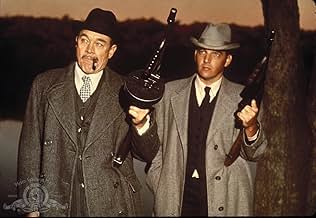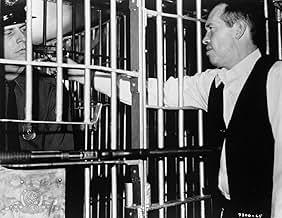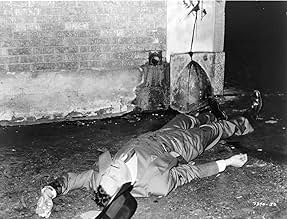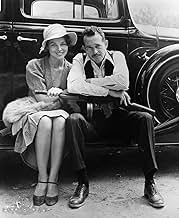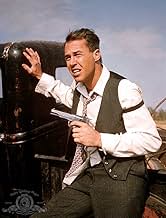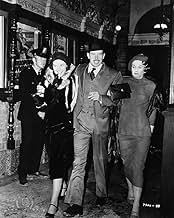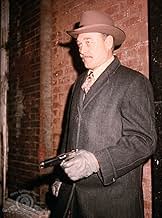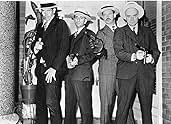IMDb RATING
6.9/10
6.4K
YOUR RATING
John Dillinger and his gang go on a bank robbing spree across the midwest, but one G-Man is determined to bring him down.John Dillinger and his gang go on a bank robbing spree across the midwest, but one G-Man is determined to bring him down.John Dillinger and his gang go on a bank robbing spree across the midwest, but one G-Man is determined to bring him down.
- Awards
- 1 nomination total
John P. Ryan
- Charles Mackley
- (as John Ryan)
Jules Brenner
- Wilbur Underhill
- (uncredited)
David Dorr
- Leroy
- (uncredited)
Roland Bob Harris
- Ed Fulton
- (uncredited)
George O. Heath
- John Dillinger, Sr.
- (uncredited)
- Director
- Writer
- All cast & crew
- Production, box office & more at IMDbPro
6.96.3K
1
2
3
4
5
6
7
8
9
10
Featured reviews
Funny, But Hilariously Inaccurate
The scene at the beginning of the film where the old man at the gas station treats Homer Van Meter with such contempt is hilarious.
Billie Frechette is shown firing a gun at the feds in one scene; it didn't happen. The end credits say she died a spinster; she was married twice. Harry Pierpont was wounded in an attempted escape from death row; three weeks later he was still unable to walk (he'd been shot four times), so they carried him to the electric chair, strapped him in, and threw the switch.
Pretty Boy Floyd was wounded running from the farmhouse, but the wound wasn't mortal. When Purvis asked him about Kansas City, Floyd let go such a stream of profanity that Purvis had Agent Herman Hollis shoot him with a Thompson. Hollis had fired one of the rounds that hit Dillinger (although not the fatal one), and he and another agent died while mortally wounding Baby Face Nelson in November of that year.
The scene outside the Biograph is ridiculous. It was scalding hot, which is why Dillinger and the two women went to an air-conditioned theater. The movie shows everyone in overcoats, including Dillinger. He had on an open-collared shirt and a white straw hat. Purvis didn't shoot Dillinger at all; the fatal round was fired by an agent brought up from Texas.
I do, however, love the line about Handsome Jack Klutas (who, by the way, attended college, but had no "college degree"): "I knew I'd never take him alive. I didn't try too hard, neither." That scene, of course, never happened. Purvis wasn't even there when Klutas was killed.
Billie Frechette is shown firing a gun at the feds in one scene; it didn't happen. The end credits say she died a spinster; she was married twice. Harry Pierpont was wounded in an attempted escape from death row; three weeks later he was still unable to walk (he'd been shot four times), so they carried him to the electric chair, strapped him in, and threw the switch.
Pretty Boy Floyd was wounded running from the farmhouse, but the wound wasn't mortal. When Purvis asked him about Kansas City, Floyd let go such a stream of profanity that Purvis had Agent Herman Hollis shoot him with a Thompson. Hollis had fired one of the rounds that hit Dillinger (although not the fatal one), and he and another agent died while mortally wounding Baby Face Nelson in November of that year.
The scene outside the Biograph is ridiculous. It was scalding hot, which is why Dillinger and the two women went to an air-conditioned theater. The movie shows everyone in overcoats, including Dillinger. He had on an open-collared shirt and a white straw hat. Purvis didn't shoot Dillinger at all; the fatal round was fired by an agent brought up from Texas.
I do, however, love the line about Handsome Jack Klutas (who, by the way, attended college, but had no "college degree"): "I knew I'd never take him alive. I didn't try too hard, neither." That scene, of course, never happened. Purvis wasn't even there when Klutas was killed.
A fine film...
I watched this for the first time in years after picking up the Widescreen DVD in the bargain bin. As a youngster, I remember many of these films for the bloodletting. How we used to talk them up afterwards. Often I'm disappointed after watching it many years later. 'Hey, that's not how I remember it. Well, 'Dillinger' isn't one of those films. This is a fine film, in fact, it's probably the number 2 film, behind 'Bonnie And Clyde' from that time that portrayed the Depression Era robbers. Warren Oates is excellent. He didn't get the chance very often to play the lead, but this was an excellent chance for him to bust out a little. And there are lots of recognizable actors in smaller roles. But this is Warren nearing his peak. It's as exciting as I remember, actually better then I remember. Well paced with a couple of slower interludes, that towards the end are kind of framed together. If you get a chance watch this film. You'll be pleasantly surprised. Oh and this DVD has the original 'We're In The Money' opening credits, plus it has the diclaimer at the end after the feature is over. I gave it a 7 out of 10.
This is the most known version based on the real life of notorious gangster of the 30s
Based on the violent career of John Dillinger and his gang , this is a Dillinger biography who roamed US , terrifying the Midwest, robbing banks and killing . It is brought to life in this story about the most colorful period of criminality in America. It's set during the Depression era, when any job , even illegal one, was cherished, greed , money and power originated an interminable cycle of fury and violence. John Dillinger is magnetically played by Warren Oates stars who became public enemy number one and Melvin Purvis,Ben Johnson, as tough G-Man under direct orders of Edward Hoover. Oates and the support cast turn a fine performance in this enjoyable account of the criminal life. It receives an extremely strong and thrilling fast-paced treatment , almost too violent and intense at the time, but remains impressive and brilliant and not easily forgotten.
The film starts on half his criminal career, Dillinger didn't stop criminal rampage until a single FBI agent worked to chase the crime boss. After the spectacular escape from Lima (Ohio) prison , Dillinger and his band along with his girlfriend Evelyn Billie Trechette(Michelle Phillips)hold up bank in Racine(Wisconsin), and rob the First National Bank of Chicago East, Indiana. But Dillinger is trapped in Tucson and moved to Crown Point(Indiana). He's sent prison and in spite of security taken by 50 policemen and the National Guardsmen , he breaks out with a gun of wood . Then, he created a new band formed by Hamilton , Pierpont( Geoffrey Lewis) , Homer Van Meeter(Harry Dean Stanton), Eddie Green , McKeley (John Ryan) , Tommy Carroll , Pretty Boy Floyd(Steve Kanaly) and Lester Gilles , alias Baby Face Nelson (Richard Dreyfuss) . They going on robbing banks , such as the Security National Bank and Trust of Sioux falls in Dakota South and the Merchant's National Bank of South Bend , Indiana . Other starring in the final chase of Dillinger , is Anna Sage 'The lady in red' (Cloris Leachman) a Romanian immigrant submitted possible deportation and she double-crossed him and informed to Melvin Purvis about the outlet from Biograph theatre where found Dillinger . Finally 'The lady in red' was deported to Romania in 1935 and never returned America . Evelyn Trechette and John Dillinger Sr toured the country in 1935 with a show called 'Crime does not pay', she died , a spinster on an Indian reservation in 1969 . Harry Pierpont was jailed and condemned electric chair , Van Meeter , Mckley , Pretty Boy Floyd and Baby Face Nelson surrounded by policemen were shot to death . Marvin Purvis quited the FBI after Dillinger case and went into private business . He shot himself in 1961 with the same gun he used to kill Dillinger . Dillinger new address the combat silhouette targets used by the FBI .
Other adaptations about this know story, are the following :
'Dillinger(1945)' directed by Noel Nosseck with Laurence Tierney and Anne Jeffreys ; 'Young Dillinger' (1965) by Terry Morse with Nick Adams; 'Lady in Red' (1979) by Lewis Teague with Robert Conrad and Pamela Sue Martin ; Dillinger(TV, 1991) with Mark Harmon and Sherilyn Fenn and 'Dillinger and Capone' by John Purdy with Martin Sheen and F. Murray Abraham.
The film starts on half his criminal career, Dillinger didn't stop criminal rampage until a single FBI agent worked to chase the crime boss. After the spectacular escape from Lima (Ohio) prison , Dillinger and his band along with his girlfriend Evelyn Billie Trechette(Michelle Phillips)hold up bank in Racine(Wisconsin), and rob the First National Bank of Chicago East, Indiana. But Dillinger is trapped in Tucson and moved to Crown Point(Indiana). He's sent prison and in spite of security taken by 50 policemen and the National Guardsmen , he breaks out with a gun of wood . Then, he created a new band formed by Hamilton , Pierpont( Geoffrey Lewis) , Homer Van Meeter(Harry Dean Stanton), Eddie Green , McKeley (John Ryan) , Tommy Carroll , Pretty Boy Floyd(Steve Kanaly) and Lester Gilles , alias Baby Face Nelson (Richard Dreyfuss) . They going on robbing banks , such as the Security National Bank and Trust of Sioux falls in Dakota South and the Merchant's National Bank of South Bend , Indiana . Other starring in the final chase of Dillinger , is Anna Sage 'The lady in red' (Cloris Leachman) a Romanian immigrant submitted possible deportation and she double-crossed him and informed to Melvin Purvis about the outlet from Biograph theatre where found Dillinger . Finally 'The lady in red' was deported to Romania in 1935 and never returned America . Evelyn Trechette and John Dillinger Sr toured the country in 1935 with a show called 'Crime does not pay', she died , a spinster on an Indian reservation in 1969 . Harry Pierpont was jailed and condemned electric chair , Van Meeter , Mckley , Pretty Boy Floyd and Baby Face Nelson surrounded by policemen were shot to death . Marvin Purvis quited the FBI after Dillinger case and went into private business . He shot himself in 1961 with the same gun he used to kill Dillinger . Dillinger new address the combat silhouette targets used by the FBI .
Other adaptations about this know story, are the following :
'Dillinger(1945)' directed by Noel Nosseck with Laurence Tierney and Anne Jeffreys ; 'Young Dillinger' (1965) by Terry Morse with Nick Adams; 'Lady in Red' (1979) by Lewis Teague with Robert Conrad and Pamela Sue Martin ; Dillinger(TV, 1991) with Mark Harmon and Sherilyn Fenn and 'Dillinger and Capone' by John Purdy with Martin Sheen and F. Murray Abraham.
Fearless. Relentless. Public Enemy #1.
Director John Milius also takes writing credit for this very colorful look at the most famous bank robber John Dillinger(Warren Oates). This story begins in the middle of his criminal career ending in his death at the Biograph Theater. This is a very romanticized tale complete with Baby Face Nelson(Richard Dreyfuss) and Pretty Boy Floyd(Steve Kanaly). Ben Johnson plays FBI agent Melvin Purvis who has an ego to match Dillinger's. Cloris Leachman plays Anna Sage, the infamous Woman in Red. Throw in Michelle Phillips as a girlfriend and Harry Dean Stanton as minion Homer Van Meter and you have the key players in this very colorful and violent movie. Liberty is taken with history for entertainment sake and besides the profanity filled script is not the selling point...the manic gun battles get most of the attention. The gun play is bloody and frequent; some of the roughest ever filmed. For a less colorful, but very interesting version check out DILLINGER(1945)starring Lawrence Tierney.
A good leading role for Warren Oates.
"Dillinger" is one of the best films from Warren Oates. He is better known as a character actor, supporting player and a fine one at that. Occasionally, he was given the lead. The film has great action and Warren Oates bears a striking resemblance to the real life bandit, John Dillinger. Ben Johnson is terrific as the F.B.I agent who is on Dillinger's trail. A minor classic.
Did you know
- TriviaJ. Edgar Hoover protested this film being made and demanded that changes be made to the script to depict the FBI in a better light (see below). Shortly before his death he recorded a disclaimer to the film; it can be heard (spoken by an imitation voice) after the closing credits. The film depicts John Dillinger being shot outside the Biograph after he pulls his gun; in fact, Dillinger never pulled a gun that night. The FBI decided they were going to kill Dillinger rather than attempt to take him alive; they announced their presence, he turned to run, and was shot six times in the back.
- GoofsNotes at the end of the movie claim that Melvin Purvis shot himself with the gun he killed John Dillinger with. In fact, the gun used to self-inflict his fatal wound was given to him by his colleagues at the FBI when he retired in 1935, the year after Dillinger was shot.
- Quotes
[repeated line]
Homer Van Meter: Goddamit! Things ain't workin' out for me today!
- Crazy creditsAfter the closing credits a verbal renouncing of gangster films written by FBI chief J. Edgar Hoover is heard: he was scheduled to read it for the film, but died before it started production. Hoover's text is read at the film's close by voice actor (Paul Frees) decrying the film and calling it a source of corruption for children.
- Alternate versionsTwo different versions with different main title music exist_ The original version features the song "We're in the Money" being played while snap shots of homeless and poor people are shown on the screen. The alternate version has the same visuals but with a simpler instrumental cue (called "Theme from Dillinger" on the soundtrack LP).
- ConnectionsFeatured in Breakaway (1990)
- SoundtracksThe Gold Diggers' Song (We're in the Money)
(uncredited)
Music by Harry Warren
Lyrics by Al Dubin
Sung during the opening credits
- How long is Dillinger?Powered by Alexa
Details
- Release date
- Country of origin
- Languages
- Also known as
- Jagd auf Dillinger
- Filming locations
- Oklahoma City, Oklahoma, USA(Nightclub for Purvis engagement party; Purvis meets lady in red; Biograph Theater scene where Dilliger dies)
- Production company
- See more company credits at IMDbPro
Box office
- Budget
- $1,000,000 (estimated)
- Runtime
- 1h 47m(107 min)
- Color
- Aspect ratio
- 1.85 : 1
Contribute to this page
Suggest an edit or add missing content


